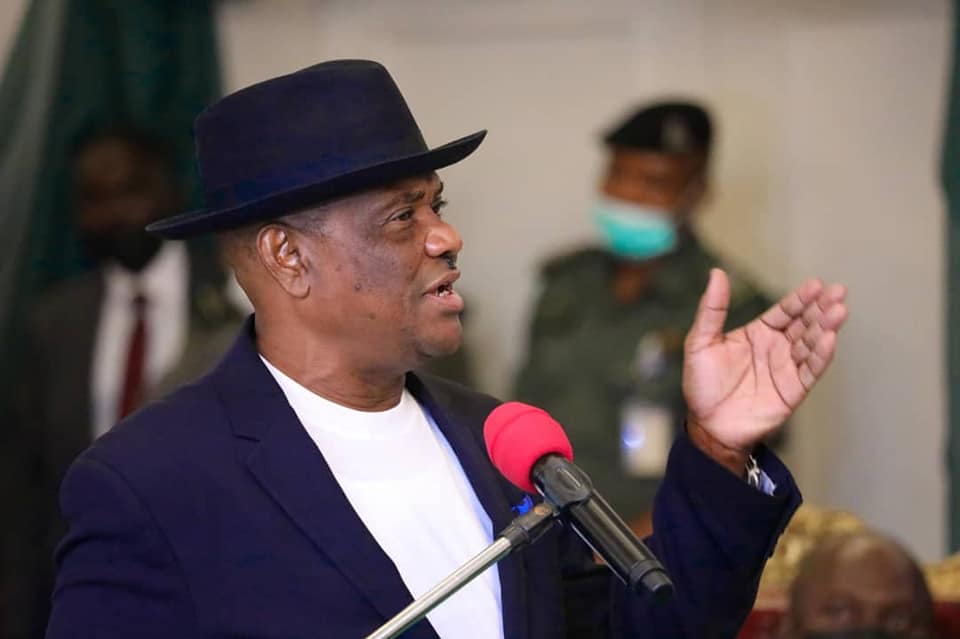Editorial
Wike, Still Delivering On Promises

The Rivers State Governor, Chief Nyesom Wike, is now making another round of history as he continues commissioning and launch of projects in several parts of the state. The process has already begun with the commissioning of the Rumuola flyover last Thursday by the former Ondo State Governor, Dr Olusegun Mimiko.
Also commissioned last Saturday was the GRA Flyover. A statement by the state government declared that the Ezimgbu Road would be commissioned today, December 13, 2021; with another commissioning of Tombia Road Extension scheduled for tomorrow, December 14, 2021. The governor will equally commission the Safe Home, Borikiri, Port Harcourt on Wednesday, December 15; while Thursday, December 16, 2021, will be the turn of Odokwu internal roads.
Moreover, Governor Wike would maintain the flag-off of key infrastructure projects with Chokocho-Igbodo Road slated for Monday, December 20, 2021; Oyigbo-Okoloma Road on Wednesday, December 22, 2021; and the Magistrates’ Court complex, Port Harcourt on Thursday, December 23, 2021.
Recall that in January this year, Rivers State was agog for about three weeks as distinguished citizens of Nigeria joined Wike to either commission or flag off projects in 11 local government areas of the state. They included the Abonnema Ring Road in Akuku-Toru Local Government Area; Bolo internal roads in Ogu/Bolo Local Government Area; Isiodu Road in Emohua Local Government Area; Isiokpo internal roads Phase 2 in Ikwerre Local Government Area; and Aluu-Rumuekini Road in Obio/Akpor Local Government Area.
Others were Mother and Child Hospital, Real Madrid Academy, the 16.6-kilometre dual carriage Saakpenwa/Bori Highway in Khana Local Government Area, the Sime-Nonwa-Kira Road in Tai Local Government Area, among a host of other projects. Several others were also commissioned last March. This remarkable development, taking place at a time when most world leaders have used COVID-19 as a bonafide excuse for non-performance, will remain legendary.
All completed projects are milestones that support meaningful developments. They stand out and have continued to garner credit for the Wike administration from well-intentioned Nigerians and residents of the state. The flyovers, especially are an additional aesthetic to the Garden City and its surroundings, and their unveiling accentuates another dream realised by the government. The Rumuola Flyover, in particular would eliminate a long struggle against the severe traffic congestion for which the area is infamous.
Undoubtedly, the projects would restore activities in the inert localities. To claim that the entire people of Rivers State are better off with these projects is to specify the conspicuous, as they would go a long way to promote their socio-economic well-being. Indeed, walking in such splendid structures evokes a thought of euphoria and fulfilment in the subconscious of the Rivers people.
As is typical of the Wike administration, prominent figures from several regions of the country are usually invited to commission projects within the state. Therefore, just as the state began to see an avalanche of actions, it has started welcoming several more Nigerians to be part of the ceremony, with effect from last Thursday.
Indeed, The Tide is extremely satisfied with the unfettered initiative by the state governor. We recount how the shattered walls of development and brotherliness were revamped in Wike’s first tenure with sectorial performances and services furnished by strategic institutions of government which have remained efficient under his leadership into his second tenure without any relapse.
Anyone in the state can attest that the construction of strategic road projects and flyovers has progressed despite Nigeria’s fiscal crisis. We sue for understanding and cooperation from all Rivers people who desire good governance which Wike provides, and urge them to remember the inglorious past when the state was on its knees from where the governor took it up to chart a new course.
Obviously, the government is not neglecting any effort to improve Rivers State. To say that Wike is rapidly transforming the landscape of the state with its gigantic development steps is to affirm the tangible. Within a limited time, the governor has whirled around the entire state into a massive construction site that in every path, substantial development projects are either ongoing or have been finalised.
We join all well-meaning people of Rivers State and Nigeria, business organisations and individuals in saluting and exalting the governor in this auspicious celebration of commissioning and launching projects. The projects on the ground so far indicate an unprecedented transformation of the state, making it a preferred refuge for investors. This gesture is proof of His Excellency’s determination to leave Rivers State better than he met it.
Interestingly, as the unveiling of new projects executed by the present adminintration is going on, Governor Wike is celebrating his birthday today.
Unarguably, the peojects are serving as a befitting birthday gift to Rivers people. There cannot be a better way to mark this auspicious moment than the unveiling of a litany of key people-oriented projects and flag-off of others. We join well-meaning Rivers people and Nigerians to wish the governor a happy brithday.
Editorial
Resolve Rumuwoji Market Issues, Others

Editorial
As NDG Ends Season 2

Editorial
Beginning A New Dawn At RSNC

-

 Politics3 days ago
Politics3 days agoSenate Urges Tinubu To Sack CAC Boss
-

 News3 days ago
News3 days agoAmend Constitution To Accommodate State Police, Tinubu Tells Senators
-

 News3 days ago
News3 days agoDisu Takes Over As New IGP …Declares Total War On Corruption, Impunity
-
Business3 days ago
President Tinubu Extends Raw Shea Nuts Export Ban To 2027
-
Business3 days ago
Crisis Response: EU-project Delivers New Vet. Clinic To Katsina Govt.
-
Business3 days ago
President Tinubu Approves Extension Ban On Raw Shea Nut Export
-
Sports3 days ago
NDG: Rivers Coach Appeal To NDDC In Talent Discovery
-
Rivers3 days ago
Etche Clan Urges Govt On Chieftaincy Recognition

